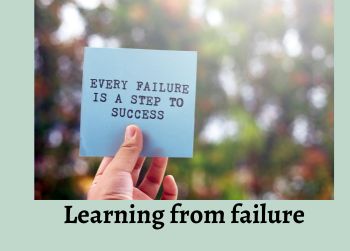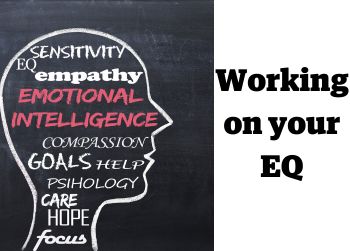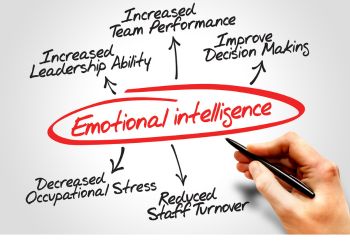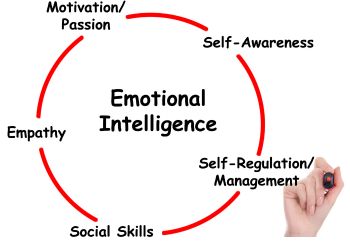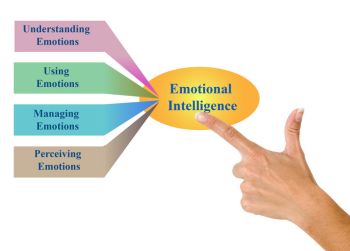A young woman I know recently failed her first attempt at her driving practical.
Ironically, it wasn’t a case of doing something wrong. She did what she had been instructed to do, which was stop when the light turned red. Unfortunately, in this case, it was in the middle of the intersection ….
The assessor saw the funny side, telling her it wasn’t often people were failed for doing the right thing. This time though, the right thing was the wrong thing for the time and place.

She told me how embarrassed she was, as, up until that moment she felt she was doing really well and was going to pass. I asked her “OK, so what have you learned from this?”
Because for every failure in life there is a lesson to be learned if you are inclined. Sometimes it takes making a mistake more than once to learn from it.
Most successful business and sportspeople will tell a similar story. For all the success – the awards, the achievements, the medals – there have been total bombs. Ideas that should have worked but didn’t. The mis-steps and mis-readings relating to customer requirements or the state of the market. Things that go spectacularly wrong.
The thing with successful businesses is that they learn from the failure, pick themselves up and move forward.
My young friend has done the same and booked another driving test, this time with some additional, hard earned, practical knowledge, and all going well, will soon be issued with a driver’s license.
It’s all about the attitude to failure.
Below is a compilation of some library resources that guide readers to a better understanding of failure and the lessons (both business and life) that can be learned from the experience.
In this Forbes article 20 leaders share times they have failed and the lessons they learned from those experiences that guided them later success.
Failure has taught me lessons I would never otherwise have understood. I have evolved more as a result of things going wrong than when everything seemed to be going right. Out of crisis has come clarity …
Elizabeth Day , author of How to fail
Elizabeth Day, author of two of the books below, has her podcast, How to fail, available via several platforms.How to fail : everything I’ve ever learned from things going wrong / Day, Elizabeth
“Inspired by her hugely popular podcast, How To Fail is Elizabeth Day’s brilliantly funny, painfully honest and insightful celebration of things going wrong. This is a book for anyone who has ever failed. Which means it’s a book for everyone. … It’s a book about learning from our mistakes and about not being afraid. Uplifting, inspiring and rich in stories from Elizabeth’s own life, How to Fail reveals that failure is not what defines us; rather it is how we respond to it that shapes us as individuals. Because learning how to fail is actually learning how to succeed better. And everyone needs a bit of that.” (Adapted from Catalogue)
Failosophy : a handbook for when things go wrong / Day, Elizabeth
“‘Most failures can teach us something meaningful about ourselves if we choose to listen’ In Failosophy Elizabeth Day brings together all the lessons she has learned, from conversations with the guests on her award-winning How to Fail podcast, from stories shared with her by readers and listeners, and from her own life, and distils them into seven principles of failure. Practical, reassuring and inspirational, these principles offer a guide through life’s rough patches. From failed exams to romantic break-ups, from career setbacks to confidence crises, from navigating anxiety to surviving loss, Failosophy recognises, and celebrates, the fact that failure connects us all. It is what makes us human. With insights from Malcolm Gladwell, Phoebe Waller-Bridge, Lemn Sissay, Frankie Bridge, Nigel Slater, Emeli Sande, Alain de Botton, Mabel, Fearne Cotton, Meera Syal, Dame Kelly Holmes, Andrew Scott and many, many more, Failosophy is the essential handbook for turning failure into success.” (Catalogue). Also available as EBook Libby and EAudiobook Libby
If you should fail : a book of solace / Moran, Joe
“Do you ever feel like a failure? Enter widely acclaimed observer of daily life Professor Joe Moran, not to tell you that everything will be all right in the end, but to reassure you that failure is an occupational hazard of being human. It’s the small print in life’s terms and conditions. Covering everything from examination dreams to fourth-placed Olympians, If You Should Fail is about how modern life, in a world of self-advertised success, makes us feel like failures, frauds and imposters. We need more narratives of failure, and to see that not every failure can be made into a success – and that’s OK. As Moran shows, even the supremely gifted Leonardo da Vinci could be seen as a failure. Most artists, writers, sports stars and business people face failure. We all will, and can learn how to live with it. … Combining philosophy, psychology, history and literature, Moran’s ultimately upbeat reflections on being human, and his critique of how we live now, offers comfort, hope – and solace.” (Adapted from Catalogue)
Failure is an option : how setbacks breed success / Robson, Terry
“Everybody has experienced failure at some stage – and we will no doubt experience it again, perhaps many times. The question is: does failure get the credit it deserves? In this inspiring and practical book, Terry Robson reveals how success cannot be achieved without a willingness to embrace failure – and shows us the opportunity that failure presents us to reflect and reassess. He delves into the notion of failure from philosophical, psychological and spiritual perspectives, and provides the tools we need to not only cope with failure, but also to learn from it”–Back cover.” (Catalogue)
Adapt : why success always starts with failure / Harford, Tim
“Outlines a counterintuitive approach to changing the world by assessing its failures, drawing on myriad disciplines to argue that complex challenges must be met through adaptive trial-and-error practices that do not depend on expert opinions or ready-made solutions.” (Catalogue)
Fail brilliantly : exploding the myths of failure and success / Davidow, Shelley
“We all spend much of our lives trying to cope with failure; sometimes we try to assign value to it, but failure looms as a debilitating concept in millions of lives, affecting children and adults alike. Fail Brilliantly proposes a radical shift: erase the word and concept of failure from the realms of education and human endeavors. Replace it with new words and concepts. This shift in position has the potential to transform our lives and ultimately reshape our definition of success!” (Catalogue)
Fueled by failure : using detours and defeats to power progress / Bloom, Jeremy
“Shining a light on the baggage he, and many other successful entrepreneurs bring along on their journey to success, professional athlete turned CEO and philanthropist Jeremy Bloom, spotlights the bag marked “failures” and unpacks. Captivating readers with anecdotes and takeaways from his successes, Bloom pulls at the common failure thread that unites him with his audience and tackles the rarely discussed facets of failure relevant to reaching career and business goals. Bloom takes aspiring and early stage entrepreneurs from the hilltops of Torino to NFL practice grounds to the struggles of startup, revealing tactical secrets – personal and learned from popular business associates, coaches, and teammates – to surviving setbacks while searching for success. Making the case (proven by many highly respected entrepreneurs) that success is never linear, Bloom introduces tactics for managing expectations for ourselves and team, recovering and rebounding after defeat, knowing what to keep and what to toss when it comes to failure’s lessons, and plotting a new course. Lessons and practices are illustrated by Jeremy’s own story, which include NFL Hall of Famers, Olympic champions, and insights and advice from business leaders. Case studies and interviews with other practicing entrepreneurs are also presented. “–” (Catalogue)
You are awesome : how to navigate change, wrestle with failure, and live an intentional life / Pasricha, Neil
“We are living in an era with the highest-ever rates of longevity, education, and wealth. For most of us famine, plague, and other life-threatening catastrophes are the stuff of history books. But there is one side effect: We no longer have the tools to handle failure– or even perceived failure. Pasricha shows us that we need to change the way we view failure. Here he shares the secrets to building resilience, which will allow us to navigate change and live an intentional life. — adapted from jacket” (Catalogue)
Win or learn : the naked truth about turning every rejection into your ultimate success / Cohen, Harlan
“The fear of rejection is universal. From being on the receiving end of a breakup to being turned down for your dream job, we’ve all experienced the sharp sting of rejection and grown to fear the risks that might lead to our next failure. After years of relentless risk-taking and rejection, New York Times bestselling author Harlan Cohen has unlocked the secret to sparking success without the fear of failure. In Win or learn, Cohen guides you through a life-changing experiment to identify your dreams, eliminate your fears, and confidently take the risks necessary to achieve every goal you set. Through Cohen’s approach, you’ll learn to want more, risk more, and ultimately achieve more”–Page 4 of cover.” (Catalogue)
Bounce back : how to fail fast and be resilient at work / Kahn, Susan
“Success. Innovation. Creativity. Growth. We all want these things at work – but the one thing they all have in common is that they involve failure. A fear of failure, or the inability to bounce back and learn from failures, is one of the biggest things that can hold us back in our professional development – so how do we learn how to fail well and develop our resilience? Wherever we work, and whatever role we deliver, we all have the power to change our thinking and our response to failure – Bounce Back is here to help. Written by consultant and teacher, Dr Susan Kahn, this book will show you how to embrace failure. Failing fast, failing well, and learning how to be agile and resilient at work is a vital part of being a successful and innovative leader, approaching opportunities with excitement and creativity, and driving forward your personal and professional growth. Packed with practical exercises, inspirational case studies, and a useful resilience self-assessment guide, Bounce Back will show you how to invest in your resilience in a deliberate way, and empower you to face risk head-on. From learning how to respond well to critical feedback, to understanding cultural attitudes to failure around the world, this book will help you be a stronger, more resilient you”– Provided by publisher.” (Catalogue)
If you need more information please contact the Prosearch team at the library. We can help you find information across a range of perspectives and resources. All enquiries are treated in confidence.


